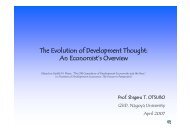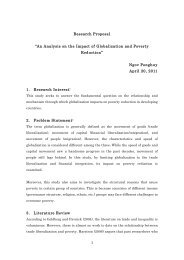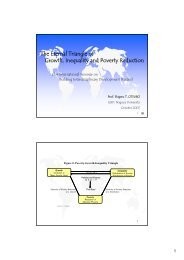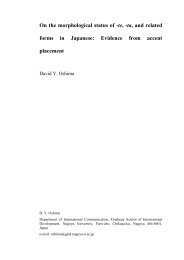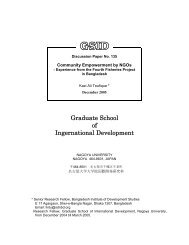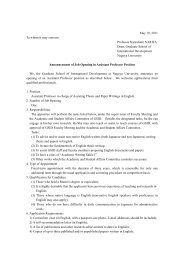Report
Report
Report
Create successful ePaper yourself
Turn your PDF publications into a flip-book with our unique Google optimized e-Paper software.
116 QUANTIFICATION OF BENEFITS FROM ECONOMIC COOPERATION IN SOUTH ASIA<br />
construction industry in the country. 6 The CDB is<br />
responsible for registration, classification and monitoring<br />
of consultants, contractors, and their performance.<br />
There is nothing in its rules and regulations which could<br />
suggest the presence of any discriminatory provisions.<br />
Since the country heavily depends on other countries’<br />
assistance in the area of construction particularly on<br />
India there does not seem to be any explicit discriminatory<br />
provisions.<br />
Current development theories contend that<br />
infrastructure together with integration into the world<br />
economy is essential for economic development<br />
(UNESCAP 2003). Small countries such as Bhutan face<br />
considerable challenges, as the cost of infrastructure<br />
provision is very high, and successful integration is<br />
constrained by several structural and locational<br />
problems associated with smallness and remoteness.<br />
The high costs of infrastructure provision makes small<br />
countries heavily dependent on external assistance for<br />
capital investments.<br />
Bhutan should undertake liberal commitments in<br />
the sector that will help it improve its infrastructure.<br />
This will have very positive implications for tourism<br />
services. It should also make its Mode 4 regime liberal<br />
so that other South Asian countries can gain market<br />
access for their professionals and workers. This will<br />
improve the overall quality of labour in the country<br />
and may lead to skill enhancement in the local labour.<br />
Other Regulations Affecting Trade in<br />
Construction Services<br />
Recognition<br />
As already noted, Article VII of GATS specifies that<br />
for the fulfillment of its standards, licensing or certification<br />
of service suppliers, a member may recognise the<br />
education and experience obtained or licenses or<br />
certification granted in a country. This article thus urges<br />
members to recognise the educational or other<br />
qualifications of service suppliers of other countries.<br />
Recognition related issues are of crucial significance to<br />
developing countries including South Asian ones as lack<br />
of such recognition of professional qualifications can<br />
act as a formidable barrier to providing services<br />
especially via movement of natural persons. As per the<br />
provision of this article, members have an obligation<br />
to notify the Council for Trade in Services (CTS) of<br />
existing recognition agreements as well as new ones<br />
that are negotiated. However, it appears that not all<br />
such agreements are notified. It can therefore be argued<br />
6<br />
About the CDB, http://www.cdb.gov.bt/aboutcdb.htm, last visited on 24 October 2007.<br />
that adequate opportunity is not being provided to<br />
other members to indicate their interests in participating<br />
in these negotiations. In view of the ineffectiveness of<br />
notification obligations one would tend to consider this<br />
article as any other best endeavour clause (Kumar<br />
2005). Further, the problem is that there is no provision<br />
for mandated review or negotiation on this article to<br />
make desired improvement.<br />
Perhaps the most important domestic policy issue<br />
to be addressed relates to the recognition of qualifications.<br />
Lack of recognition of qualifications often constitutes<br />
a major barrier to entry by South Asian service<br />
suppliers, who are largely outside existing recognition<br />
initiatives and thus at a disadvantage in various services<br />
where licensing and certification requirements apply<br />
to entry (Chanda 2005). However, India has made an<br />
historical attempt by having taken some steps in this<br />
direction in its agreement with Singapore- CECA. The<br />
CECA has a list of professionals and both parties are<br />
expected to recognise their qualifications. In the context<br />
of South Asia it is suggested that a similar exercise<br />
should be carried out. However, here apart from professionals,<br />
the list must also include less skilled and semiskilled<br />
workers.<br />
At the South Asian level developing MRAs with a<br />
view to recognising qualifications of engineers,<br />
architects, town planners, and all other skilled or semiskilled<br />
workers will be immensely beneficial to the<br />
South Asian countries in facilitating trade in construction<br />
services. Having the precedence of India–Singapore<br />
agreement and an agreement in the pipeline with Sri<br />
Lanka, developing MRAs in the sector may not be that<br />
daunting. One bilateral agreement will enable the region<br />
to apply it to all other countries. The most important<br />
point is that since Mode 4 is the most restricted mode<br />
at the regional level the gains will also be most from<br />
liberalising it and MRAs would play an instrumental<br />
role in facilitating the presence of natural persons.<br />
However, since the issue of MRAs is complex it deserves<br />
more detailed discussion and accordingly, this has been<br />
discussed in the Chapter 5.<br />
Classification issue: In view of related professional<br />
services being placed under the business services sector<br />
under W/120 classification, Cuba argues that members<br />
should hold discussions within the purview of the<br />
existing interrelationship between the construction and<br />
related engineering services sector and the professional<br />
services sector with regard to architectural services,<br />
engineering services, integrated engineering services and




